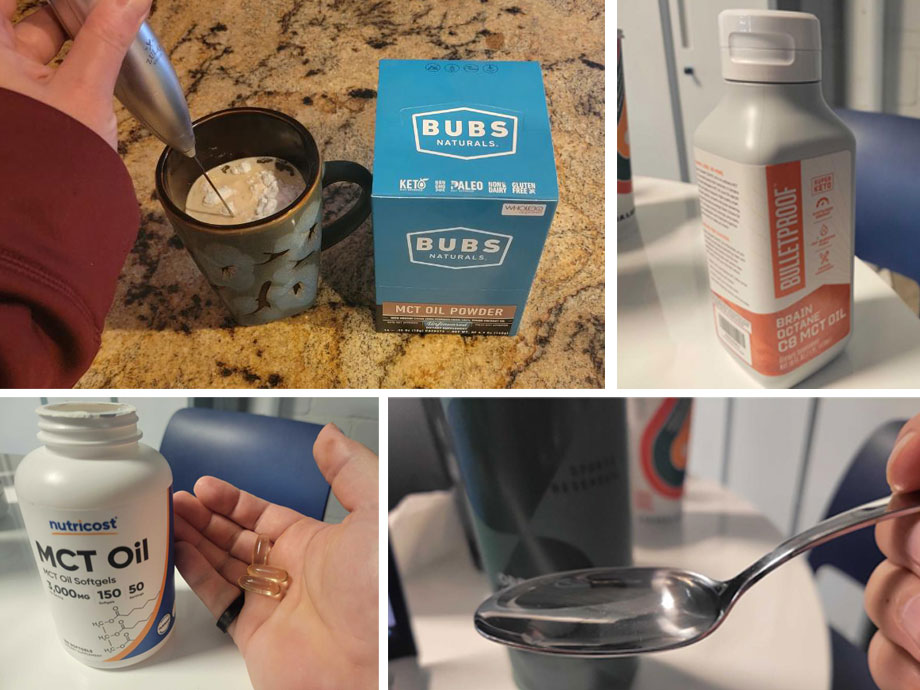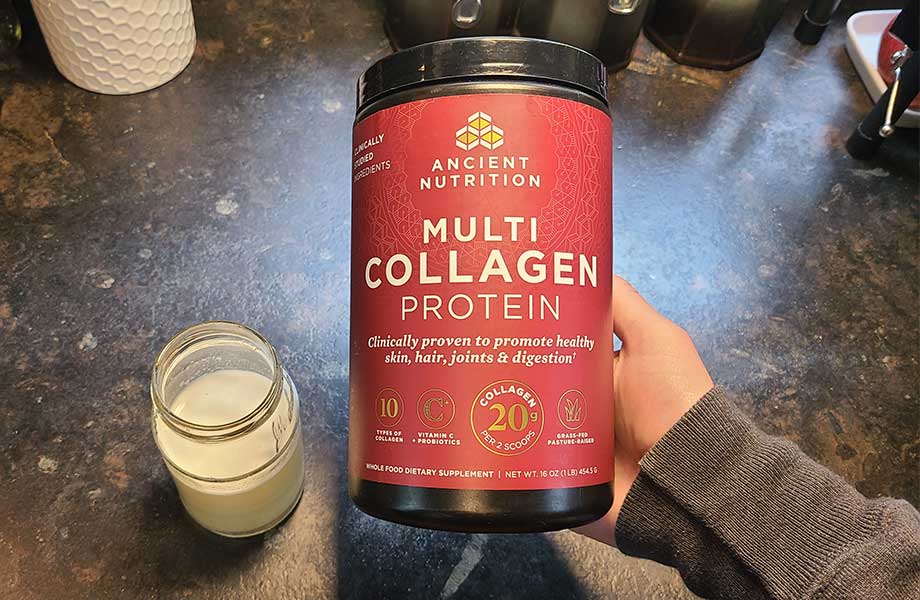If you’re looking up the best MCT oil, it’s a fair bet you’re already deep in the rabbit hole of nutritional research. So now it’s our job to point you in the right direction. We do have to say up front that most of the health benefits propping MCT oil up are way overblown, but it can have some utility when used responsibly, especially for those following low-carb diets.
RELATED: What is the Keto Diet?
MCT oil usually contains one or a combination of the main triglycerides that help the body produce ketones, caproic acid, caprylic acid, capric acid, and lauric acid. We’ll talk more about these later, but the long and short (no pun intended) is that their chemical structure allows them to behave differently than regular fats or long-chain triglycerides.
Please recognize that, despite what you may have heard, MCT oil is not in the same category as healthy fats like olive oil in terms of keeping the heart healthy. So, they should be consumed sparingly and after getting some medical advice from your primary care physician.
Medical disclaimer: This article is intended for educational and informational purposes only. It is not intended as a substitute for medical advice. For health advice, contact a licensed healthcare provider.
Best MCT Oil
- Best MCT Oil Overall: Sports Research Organic MCT Oil
- Best MCT Oil for Weight Loss: Nutricost MCT Oil Softgels
- Best MCT Oil for Brain Function: Onnit MCT Oil
- Best MCT Oil for Coffee: Bulletproof Brain Octane C8 MCT Oil
- Best MCT Oil Powder: BUBS Naturals MCT Oil Powder
- Best Organic MCT Oil: Performance Lab MCT Energy Oil
- Best Budget MCT Oil: Nature’s Way Organic MCT Oil
- Best MCT Oil for Keto: Garden of Life MCT Oil
Best MCT Oil Overall: Sports Research Organic MCT Oil
Good for: Those who want a tasteless oil that’s third-party tested
Best Overall
Sports Research Keto MCT Oil
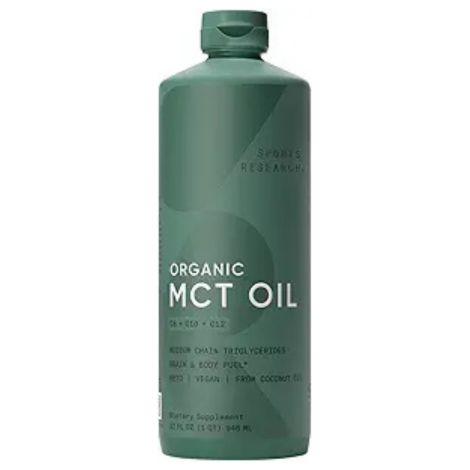
Product Highlights
-
Liquid coconut oil medium chain triglyceride (MCT) supplement
-
Contains C8, C10, and C12 fatty acids
-
Listed benefits: Brain and body fuel
Pros & Cons
Pros
- ubscribe and save 15% and free shipping
- Certified vegan, USDA organic, and Non-GMO project verified
- Third party tested and Informed Choice certified
- Made in a cGMP-compliant facility
- Keto friendly
- Available in multiple sizes and individual packets
Cons
- May create stomach discomfort according to customer reviews
- Only use with metal, glass, ceramic, HDPE plastics containers – MCT oil can dissolve some plastics/styrofoam
- Not suitable for customers allergic to tree nuts
- Mixed reviews on effectiveness and mixability especially with hot liquids
Bottom Line
Sports Research Organic MCT oil is derived from coconut oil and features a combination of C8, C10, and C12 fatty acids. Customer reviews were mixed for effectiveness and mixability. Multiple customers discontinued use to due to digestive symptoms like diarrhea.
Having been founded in Southern California in 1980, Sports Research is a family-owned company that has been previously explored many times by our team. Sports Research is trusted by athletes for having plenty of third-party tested products, and their MCT Oil is no different.
RELATED: Sports Research Whey Protein Review
Sports Research Organic MCT Oil is USDA-certified organic and third-party tested by Informed Choice; it’s also non-GMO and gluten-free. To understand how their oil is composed, we need to understand the different types of MCTs there are:
- C6: Caproic acid
- C8: Caprylic acid
- C10: Capric acid
- C12: Lauric acid

The difference in names and numbers simply denotes how many carbon molecules each fatty acid chain contains. Sports Research makes a point to highlight that it includes MCTs from C8, C10, and C12 primarily, likely because studies show1 these, in particular, are more easily digested and more efficient as an energy source.
We had GGR Senior Staff Writer Caine Wilkes, OLY, USAW-L1, test Sports Research Organic MCT Oil. He rated the taste—or the lack thereof—a 4.5 out of 5. “It’s unflavored and mostly flavorless, even when I tried taking it straight, so it’s pretty easy to mix into other drinks or smoothies,” Caine reports.
“I was also expecting a coconut flavor that never came. That said, it’s super oily, so it might be best to mix it in your morning coffee.” We scored it a 4 out of 5 for both texture and solubility.
RELATED: Mushroom Coffee Benefits
As far as ease of use, Caine gave a 3 out of 5. “The oil comes out very quickly, and you have to squeeze the bottle to get it out, so it’s a bit difficult to measure it out into a tablespoon without making a mess.”

We do like that Sports Research uses organic ingredients and C8, C10 and C12 fatty acids for a more diverse MCT profile. It’s also great that the MCT oil isn’t derived from palm kernel oil, which contributes to deforestation.
| Price per serving | $0.43 |
| Servings per container | 63 |
| Calories per serving | 130 |
| Fat per serving | 14 g |
| Carbs per serving | 0 g |
| Form | Liquid |
| Type of MCT | 100% organic coconut oil; C8, C10, C12 |
Best MCT Oil For Weight Loss: Nutricost MCT Oil Softgels
Good for: People who want to want the health benefits of MCT Oil Supplements without the excess calories
Best for Weight Loss
Nutricost MCT Oil Softgels
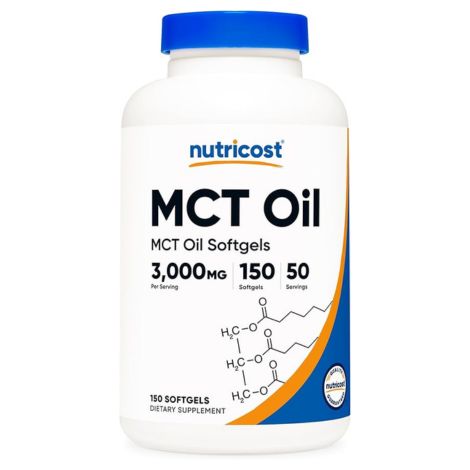
Product Highlights
-
Softgel medium chain triglyceride (MCT) supplement
-
Features C8 and C10 fatty acids
-
1,000 mg MCT oil per softgel
-
Keto friendly
Pros & Cons
Pros
- More affordable than liquid MCT supplements – less than $0.40 per serving
- Made in a GMP compliant facility
- 60 day money back guarantee
- Third-party tested
- Gluten-free, non-GMO, and keto friendly
- Alternative for people that don’t want liquid or powder
Cons
- Less MCT oil per serving than competitors – Only 3,000 mg
- Softgel features gelatin
- Source of MCT oil isn’t listed
Bottom Line
Nutricost MCT oil softgels provide an alternative for customers that dislike liquid and powder forms. However, Nutricost does not provide information on the source of MCT oil which frustrated many customers.
Nutricost is a solid brand for people trying to get health and wellness supplements on a budget, but the reason we chose their MCT oil capsules for this category is because of the low calorie count. For one serving, there’s only 25 calories.
So, if you’re looking for something keto-friendly or are working to stay in ketosis for weight loss purposes, Nutricost would be an MCT oil to look at. It’s not entirely clear where the MCT oil in these softgels is sourced, but you may be able to hazard a guess that it’s derived from coconut oil as 2.5 out of the 3 grams of fat present are saturated fat.

RELATED: Best Weight Loss Supplements
The Nutricost MCT Oil Softgels were also tested by Caine Wilkes, OLY, USAW-L, who gave them a 4 out of 5 for swallowability. “While the pills aren’t wildly large, they are sizeable; about the same shape as a typical softgel and the length of a quarter,” says Caine. “There are three pills in one serving, though, so I have to say it makes swallowing them a hassle.
Caine continues by saying, “Even though I normally don’t have any issues with capsules, I could definitely see others struggling.” He gave a 5 out of 5 for taste (or lack of), stating, “They’re unflavored, so I didn’t taste anything odd while taking them.” Caine also notes that it’s kind of nice to take MCT oil in a pill form rather than having to futz around with liquid MCT oil supplements, so he scored the softgels a 5 out of 5 for ease of use.

Before you buy, consider what goals you are trying to achieve. If you’re trying to supplement your calorie or dietary fat intake, you might want to stick with a liquid supplement, as taking three pills just to get 3 grams of fat isn’t going to be very efficient. Otherwise, Nutricost Softgels are a great way to modestly support goals such as maintaining a ketogenic diet.
RELATED: 10 Types of Diets
| Price per serving | $0.32 |
| Servings per container | 50 |
| Calories per serving | 25 |
| Fat per serving | 3 g |
| Carbs per serving | 0 g |
| Form | Softgels |
| Type of MCT | C8, C10 |
Best MCT Oil For Brain Function: Onnit MCT Oil
Good for: Individuals looking for an MCT Oil with a larger amount of C8
Best for Brain Function
Onnit Coconut MCT Oil
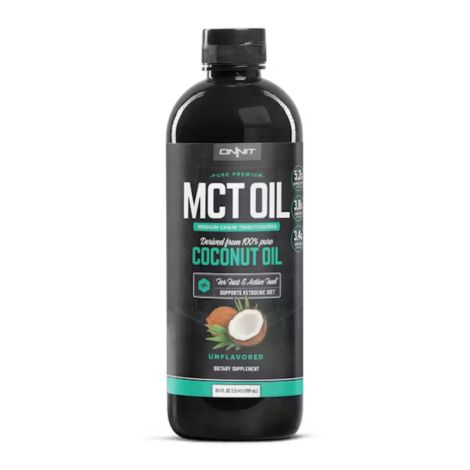
Product Highlights
-
Liquid coconut oil medium chain triglyceride (MCT) supplement
-
Listed benefits: Supports ketogenic diet and promotes energy
-
Features C8, C10, and C133 fatty acids
Pros & Cons
Pros
- Subscribe and save 15%
- Gluten free and keto
- Only one ingredient – Coconut oil MCT
- Does not require refrigeration
- More affordable than competitors
Cons
- Limited customer reviews
- Only available in one size – 24 fl oz
- Not suitable for customers with tree nut allergy
- Tends to spill over when dispensing according to customer reviews
Bottom Line
Onnit’s MCT oil supplement uses 100% coconut oil. Customers liked adding the supplement to their morning coffees or smoothies. However, some noted it can be messy when dispensing due to the oil running quickly out of the cap.
Onnit MCT Oil is unflavored and lauded in customer reviews for its ease of use in smoothies and effectiveness with weight management and curbing cravings. There were mixed reviews on the taste, however, when taken plain.
There’s limited evidence2 that MCT oil can help improve brain function in those with neurodegenerative disorders like Alzheimer’s disease. However, the science is very weak regarding the effects of the benefits medium-chain triglycerides may have on the brain health of healthy individuals.
RELATED: Onnit Alpha Brain Pre-Workout Review
That said, the brain does prefer to use glucose for sustained energy. When the body is in ketosis, however, fatty acids from foods like MCT oil can be used in the form of ketones to keep the brain running smoothly.
The reason we crowned Onnit MCT Oil the best for cognitive function is because it contains a greater percentage of caprylic acid, or C8, which helps to form ketone bodies and was the primary form of fatty acids used in studies exploring the effects of MCT oil on brain health.
| Price per serving | $0.53 |
| Servings per container | 47 |
| Calories per serving | 130 |
| Fat per serving | 14 g |
| Carbs per serving | 0 g |
| Form | Liquid |
| Type of MCT | Coconut oil; C8, C10, C12 |
Best MCT Oil For Coffee: Bulletproof Brain Octane C8 MCT Oil
Good for: People looking for an MCT oil they can mix in nearly any beverage
Best for Coffee
Bulletproof Brain Octane C8 MCT Oil
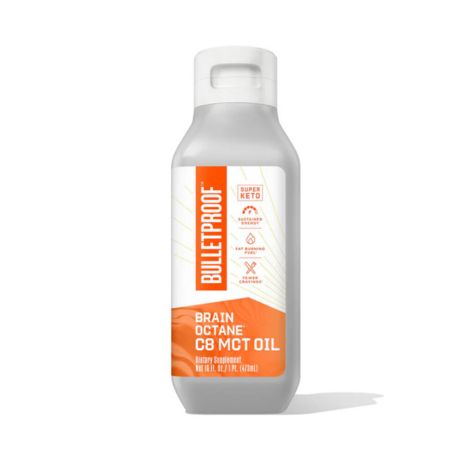
Product Highlights
-
Liquid C8 coconut oil medium chain triglyceride (MCT) supplement
-
Listed benefits: Support energy, metabolism, and cognitive function
-
Recommended addition to coffee, smoothies, salad dressing and more
Pros & Cons
Pros
- Available in multiple sizes and single serving packets
- Subscribe and save 20%
- 100% satisfaction guarantee – if not satisfied within 30 days can get moneyback
- No refrigeration required
Cons
- More expensive than competitors ranging from $0.62-$1.24 per serving
- Only use with metal, glass, ceramic, HDPE plastics containers – MCT oil can dissolve some plastics/styrofoam
- Not suitable for customers with a tree nut allergy
- May cause stomach upset initially
Bottom Line
Bulletproof MCT oil uses 100% coconut oil and only features C8 MCTs. According to Bulletproof pure C8 absorbs quicker and has more ketone energy than C8/10 blends. There were mixed reviews from customers about whether they could tell the difference between pure C8 and C8/10 blends.
If you’ve ever wondered where the term “Bulletproof Coffee” came from, look no further. If you are familiar with the name, you’re probably familiar with the keto diet, as the brand is nearly synonymous with it. Containing exclusively C8 medium-chain triglycerides, Bulletproof MCT Oil can be great for your brain as well as excellent in your morning coffee.
RELATED: Bulletproof Collagen Peptides Review

Caine Wilkes, OLY, USAW-L, was once again our guy for testing the Bulletproof Brain Octane C8 MCT Oil, and he awarded it a rating of 5 out of 5 for taste. “The bottle recommends you mix it with your preferred drink, and since it’s unflavored, I think it would go into almost any drink nicely. For me, I didn’t notice any flavoring at all when it went in my coffee; I thought it tasted great,” Caine explains.
He only gave a 3 out of 5 for solubility, however. “It’s important to remember that it is an oil, and oil is a solvent that doesn’t emulsify well in water-based drinks so I did see a lot floating on the top of my coffee, despite the coffee tasting fine.”
RELATED: How To Make Protein Coffee

This effect also led Caine to rate the texture a 4 out of 5. “The first few sips were mostly oil, so you get a lot of the oily texture of the dietary supplement,” Caine recalls. “I didn’t find it unpleasant, but I need to give a fair warning if you don’t want an oily texture with your coffee.”
Caine adds, “The spout is made for pouring, so it was easy to pour out a serving without being worried about losing control of how much comes out.” So, we gave Brain Octane C8 MCT Oil a 5 out of 5 for ease of use. We do have to note that C8 fatty acids tend to be more expensive, which would explain why Bulletproof is one of the more pricey options on our list.
| Price per serving | $0.84 |
| Servings per container | 32 (16 oz.) |
| Calories per serving | 130 |
| Fat per serving | 14 g |
| Carbs per serving | 0 g |
| Form | Liquid |
| Type of MCT | Coconut oil; C8 |
Best MCT Oil Powder: BUBS Naturals MCT Oil Powder
Good for: Individuals who prefer powdered supplements
[Product Card: 6412] [Badge: Best Powder] [Score: 4.01]
BUBS Natural MCT Oil Powder
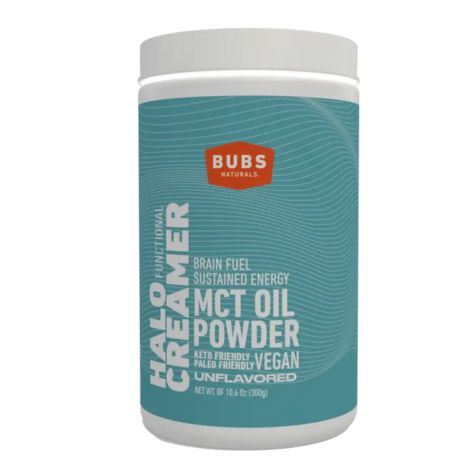
Product Highlights
-
Powder coconut oil medium chain triglyceride (MCT) supplement
-
Vegan, keto, and paleo friendly
-
Listed benefits: Support gut health, decrease cravings, and improved focus
Pros & Cons
Pros
- Subscribe and save 14% plus free shipping
- Gluten, soy, nut, corn, and GMO-free
- Paleo and keto-friendly
- Mixes well according to customers
Cons
- More expensive than liquid competitors – over $1 per serving
- Not suitable for customers with a tree nut allergy
- Limited custom reviews
Bottom Line
BUBS Naturals is a powdered form of MCT oil supplement. According to Bubs the powdered form is gentler on the stomach than the liquid form. Customer reviews found it mixed well into their morning coffees. However there were mixed reviews on the effectiveness.
In order to create a fluffy, ultralight powder that BUBS insists makes for a soluble product, BUBS Naturals mixes MCT oil with non-GMO tapioca starch and spray-dries the solution. This method makes for a product that’s better for your gut health and easier on your digestive system compared to MCT oil.
RELATED: The Carnivore Diet Food List
Another benefit to having a powder is—if you’re someone who takes multiple supplements—it makes for seamless consolidation if you also take things like collagen, creatine, or protein powder.

We had GGR Senior Editor Amanda Dvorak, CPT, test BUBS Naturals MCT Oil Powder. (She tested an old version of the formulation, but it’s the same as the Halo Creamer MCT Oil BUBS currently sells.) Amanda had some interesting feedback about the texture, which she rated a 3.5 out of 5. “I have tried this in my morning coffee, and it’s weird how it’s a powder, yet you still get some of that oily texture. I’d describe it as having some heavy cream in your morning coffee,” Amanda says.
She also gave a 4 out of 5 for taste, elaborating, “I do add some stevia when I use this MCT powder since I prefer my coffee a bit sweeter. I’ve also used this powder in my coffee blended with a mint-chocolate-flavored protein powder for a super tasty and rich protein coffee! It was like a Starbucks Peppermint Mocha.”
Amanda also didn’t have too many issues with solubility, rating a 4 out of 5. “If you want it fully blended, you might want to use a frother if you have one, but a spoon does the trick, too.” That said, she gave a 4 out of 5 rating for ease of use.

Be warned, though BUBS advertises itself as being nut-free, it’s still made from coconuts and even notes the dietary supplement is processed in the same facility as peanuts, almonds, milk, and fish. So, if you have allergies, it may be best to steer clear.
| Price per serving | $1.23 |
| Servings per container | 30 |
| Calories per serving | 35 |
| Fat per serving | 5 g |
| Carbs per serving | 5 g |
| Form | Powder |
| Type of MCT | Coconut oil; C8, C10 |
Best Organic MCT Oil: Performance Lab MCT Energy Oil
Good for: Individuals who want an organic product with a simple formula
Best Organic
Performance Lab MCT Energy Oil
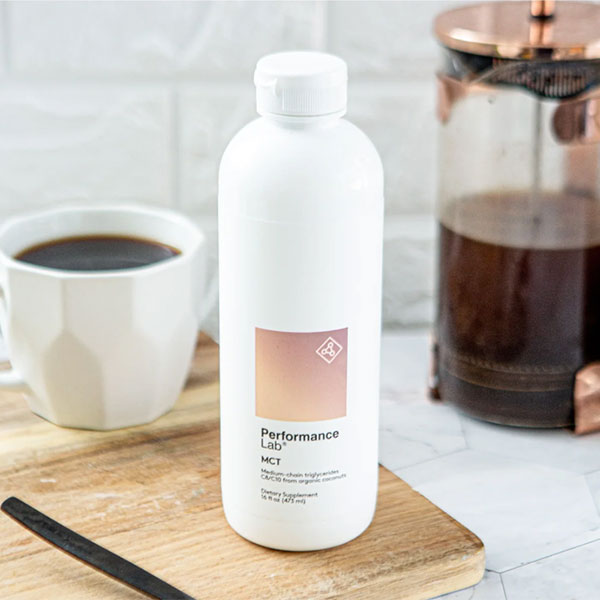
Product Highlights
-
Available in 1- and 2-month supplies
-
Ingredients to help support brain health, athletic performance, and cell energy
-
Cold-extracted with hexane-free technology and triple-distilled for purity
-
Label project certified, USDA-organic, non-GMO project verified
-
Features C8 and C10 fatty acids
Pros & Cons
Pros
- Third-party tested
- Vegan, non-GMO, and keto friendly
- Neutral flavor that can be mixed into coffee, smoothies, soups, or sauces
- Rated 4.7 out of 5 by reviewers
Cons
- Expensive
- Not suitable for customers allergic to tree nuts
Bottom Line
Performance Lab MCT Oil is a highly-rated liquid organic MCT oil derived from non-GMO coconuts. It’s free of gluten, synthetic additives, caffeine, artificial colors and preservatives. Most important, it’s third-party tested for purity and has several certifications.
Performance Lab MCT Energy Oil is fairly new to the MCT market, but customer reviews look promising, with most praising the taste and the energy it provides. Their official product page also features a testimonial from Sophie Alisch, a professional boxer, who praises the product’s ability to give her a calorie boost during training camps after mixing it with her meals.
RELATED: How To Gain Weight Fast: A Registered Dietitian’s Strategy for Effective Results
We named it the best organic oil on this list due to the lack of extraneous ingredients and clean formulation. The MCT oil provided by Performance Lab is made from 100% organic coconuts, non-GMO, vegan, and contains no soy, egg, fish, shellfish, dairy, peanuts, or wheat.
With 130 calories and 14 grams of fat per serving, Performance Lab MCT oil has a macronutrient profile that is comparable with most other MCT oils on the market, with 8.6 of these grams being from caprylic acid, or C8 and 4.2 grams from capric acid, or C10.
Their website also makes a point to mention that a brain starved of glucose negatively affects focus, memory, mood, and long-range health, with ketones being the only alternative energy source to help the brain operate and power your athletic performance.
However, we must stress that you don’t need to boost ketone production through MCT oil to get these benefits—you can just as easily eat more carbohydrates.However, if you’re on the keto diet or another specialty diet that restricts carbs, supplements like the Performance Lab MCT Oil may work for your needs.
Performance Lab also asserts it’s been proven that MCT mitochondria support improves muscle function under high temperatures. The only studies we were able to find to support this claim were done on mice3. So, it can be safe to assume more research is needed.
Finally, we really aren’t a fan of this oil being advertised as “allergen-free” when it clearly abides by the USDA rule of listing potential allergens under the nutrition facts and Performance Lab lists coconuts as an allergen.
All things considered, if the price tag doesn’t bother you—you can save quite a bit from signing up for one of their subscriptions—and you value 100% organic supplements, Performance Lab is a great option.
RELATED: Best Keto Protein Powder
| Price per serving | $1.26 |
| Servings per container | 31 |
| Calories per serving | 130 |
| Fat per serving | 14 g |
| Carbs per serving | 0 g |
| Form | Liquid |
| Type of MCT | Coconut oil; C8, C10 |
Best Budget MCT Oil: Nature’s Way Organic MCT Oil
Good for: Those who want a cost-effective ways to take multiple daily servings of MCT oil
Best Budget
Nature’s Way Organic MCT Oil
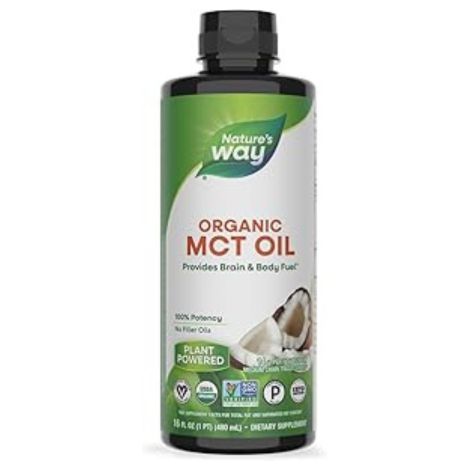
Product Highlights
-
Liquid organic coconut oil medium chain triglyceride (MCT) supplement
-
Listed benefits: Absorbs and is converted to energy quickly, stays liquid even when refrigerated, and helps you feel full
-
Features C8 and C10 fatty acids
-
Recently rebranded with new packaging
Pros & Cons
Pros
- Only one ingredient – coconut oil MCTs
- Certified vegan and NON-GMO project verified
- Does not require refrigeration
- 45-day satisfaction guaranteed
Cons
- May cause stomach upset according to customer reviews
- Does not require refrigeration
- Not suitable for customers allergic to tree nuts
- Mixed reviews on effectiveness and mixability
Bottom Line
Nature’s Way Organic MCT Oil uses 100% coconut oil and features C8 and C10 fatty acids. Customer reviews are mixed on effectiveness. Multiple customers experienced stomach symptoms and had to stop using the supplement. Nature’s Way has a 45-day satisfaction guarantee so if you experience stomach issues you can get your money back.
Nature’s Way is a brand that prides itself on partnering with farmers and suppliers to create high-quality products for over 50 years, with most products being GMO-free. From enzymes to probiotics, Nature’s Way is a name most recognized in the supplement space for good reason.

Don’t believe us? At the time of writing, Nature’s Way Organic MCT Oil is the #1 best-selling MCT Oil on Amazon and has a whopping 45,054 reviews that average 4.6 out of 5 stars.
The recommended use of Nature’s Way MCT Oil is one to three times daily, so if you’ll be using it for ketosis often, you’ll come to appreciate this being the best budget option at barely $0.50 per serving. You can save even more by buying a bigger, 30-fluid-ounce bottle.

Just be aware of getting carried away if one of your goals is weight management—this is still oil, after all!
| Price per serving | $0.43 |
| Servings per container | 32 |
| Calories per serving | 130 |
| Fat per serving | 14 g |
| Carbs per serving | 0 g |
| Form | Liquid |
| Type of MCT | Coconut oil; C8, C10 |
Best MCT Oil for Keto: Garden of Life MCT Oil
Good for: People who are just getting introduced to low-carb supplements
Best for Keto
Garden of Life Organic Coconut MCT Oil
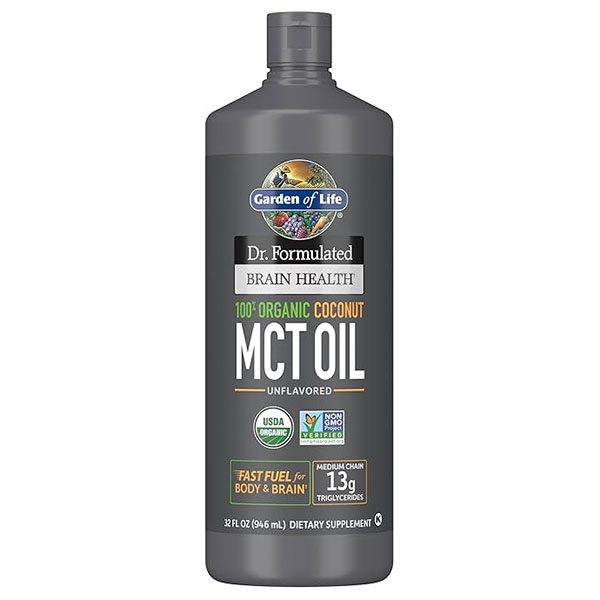
Product Highlights
-
Liquid coconut oil medium chain triglyceride (MCT) supplement
-
Listed benefits: Quick fuel for brain and body, promotes brain health, and quickly digested and converted into energy
-
Features C8 and C10 fatty acids
-
Appropriate for those on paleo and keto diets
Pros & Cons
Pros
- Only one ingredient – Coconut MCTs
- Paleo, keto, Non-GMO, certified gluten free, no dairy, no soy, and USDA organic
- No refrigeration required
- No artificial sweeteners, flavors, colors, or chemicals
Cons
- Customers noted the bottles sometimes leak in transit
- Not suitable for people with tree nut allergy
- Manufactured in a facility that also processes soy, dairy, tree nuts, fish, and shellfish
Bottom Line
Garden of Life Organic Coconut MCT Oil is a liquid supplement designed to quickly provide energy. Customers liked adding it to their morning cup of coffee for an added energy boost.
Garden of Life MCT Oil currently holds an average rating of 4.7 out of 5 stars on Amazon based on 1,820 customer reviews. The feedback is overwhelmingly positive, with critical reviews being mainly about some leakage on the bottle.
RELATED: Best Keto Meal Delivery Service

The product contains only one ingredient: 100% organic coconut medium-chain triglycerides. Garden of Life recommends mixing their MCT oil with other foods such as coffee, yogurt, and even salad dressings.
For what it is, you could argue the formulation is almost identical to pricier brands. So, if you follow or just started following a keto diet and want to dip your toe into the MCT world without spending a fortune, Garden of Life would be a safe place to get started.
| Price per serving | $0.57 |
| Servings per container | 63 |
| Calories per serving | 130 |
| Fat per serving | 14 g |
| Carbs per serving | 0 g |
| Form | Oil |
| Type of MCT | Coconut oil; C8, C10 |
Other MCT Oils We Researched
- Viva Naturals Organic MCT Oil: We think this looks like a good product, but there doesn’t seem to be anything unique about it that makes it stand out from the ones that made our list.
- BioTrust Multi Collagen Protein Powder + Keto MCT Oil: While it has a lot of positive reviews on Amazon, many customers seem to have issues getting it to dissolve. Several customers also complain about the packaging.
How We Picked and Tested the Best MCT Oil
With the rising popularity of the ketogenic diet and diets like it, the availability of medium-chain fatty acids as a supplement has also skyrocketed. Here’s how we decided which brands to include on our list.
Flavor
If you’ve ever eaten anything fatty or greasy, you know it has a tendency to coat your mouth and stick around for a while. So, if you’re going to be literally drinking oil, we would hope that we’re recommending brands that actually taste good (or have no taste at all).
This is especially true if you want to mix your MCT supplement with other beverages, as we would be remiss if we’re the ones you blame for ruining your morning coffee.
Form
We wanted to include a variety of forms of MCTs to take from the brands we decided to include. To cover all bases, for those of you who aren’t jazzed on the idea of supplementing with oil, we also took the time to highlight the best powders and pills we found.
Formulation
The thing about MCT oil is—in order to reap the benefits—you don’t need a lot on the ingredient list to get the job done. However, many supplement companies will add extraneous ingredients to set themselves apart, make fancier health claims, and charge consumers more.
RELATED: Best Fish Oil Supplement

It’s also unnecessary to have extra flavors, sweeteners, or additives where these compounds might be appropriate and even embraced with other supplements like collagen or pre-workout. We want to choose brands with simple, minimalist formulations that don’t require much interpretation.
Benefits of MCT Oil
According to a proprietary survey conducted by the GGR team, the supplement market is estimated at $182.6 billion in 2023, with certain populations searching for supplements to address concerns like cognitive function and weight management. But it’s time for some hard truth. All of the hype around MCT oil is mostly just that—hype. Despite the claims that it can accelerate fat burning, give you a super brain, and ramp up your athletic performance, there’s actually very little solid science behind the health benefits of MCT oil.
In fact, consistent use may come with more downsides than health benefits. That being said, there are still some circumstances in which MCT oil can be useful.
More Digestible Than Long-Chain Triglycerides
The big talking point surrounding the purported benefits of MCT oil is that they’re more easily digested4 than long-chain triglycerides, which get their name from containing more than 12 carbon chains in the fat molecule. Even healthy fats, like olive oil and omega-3s, are long-chain triglycerides.
Now, the body’s way of breaking down fat involves a very complicated process called oxidative phosphorylation; it essentially breaks the bonds between the carbon chains.
If there are fewer carbon chains, there are fewer bonds to break, meaning the molecule is more easily digested. This is why the shortest MCT, C8, is one of the most popular forms for its supposed fat burning—there’s no scientific evidence to support this, by the way!
RELATED: Weight Loss Pills That Don’t Work
Due to their large molecular size, long-chain triglycerides need to be rolled into chylomicrons, which then enter the lymphatic system, then go to the blood, and then the liver. However, medium-chain fatty acids are short enough to travel straight to the blood, making them a more immediate energy source.
Before you get too excited, carbohydrates provide a source of sustained energy that’s just as immediate and is the body and brain’s preferred fuel source anyway. However, for those who are going low-carb, MCTs’ ability to cut out the digestive middleman is great for those in ketosis who are using alternative energy systems.
May Help Manage Cognitive Diseases
What’s probably the most solid science behind MCT oil and how ketones can help those with impaired cognitive function, for example, Alzheimer’s disease and epilepsy5. That said, it’s paramount to understand that MCT oil can never be a replacement for prescription medications. Please get medical advice from your primary care provider before using MCT oil.

Most people are unaware that the ketogenic diet was first discovered as a treatment for epilepsy, acting as an alternative to prescription medications that are not effective for whatever reason. One promising study showed that nearly half of the epileptic subjects who were non-responders to their medication experienced fewer seizures6 after supplementing with MCT oil for 90 days.
A meta-analysis also showed that symptoms of mild to moderate Alzheimer’s disease may be relieved7 by MCT oil taken consistently over 30 days. However, the authors concluded that the results were mixed and needed more research.
RELATED: A Beginner’s Guide to the Warrior Diet
The reason MCTs have this effect is that they promote the production of ketones, which give the brain an alternative source of energy in the absence of glucose from carbohydrates.
While this is simply a survival mechanism during periods of starvation for healthy individuals, the presence of ketones forces the brain to use energy in a different way, and this alternative method of operation could have positive benefits in those with impaired brain health. This is likely where the claims of MCTs’ “brain-boosting” effects come from, but as you can see, these claims are misguided and overblown.
Beneficial For Weight Gain
Most of the oils on this list average about 130 calories per tablespoon serving, which is a pretty small package for a good number of calories. For those looking to put on some weight and want a more natural way to increase your calorie intake than something like a mass gainer, you could use MCT oil to boost calorie intake by adding it to your meals and drinks.

MCT oil is high in saturated fat, though, so if you use it for this purpose, it’s not advised that you use MCT oil as your primary source of extra calories.
More Efficient Than Coconut Oil
If you’re wondering why most MCT oil supplements are derived from coconut oil, it’s because the whole MCT craze started with coconut oil in the first place. Sure, you can also find MCTs in palm kernel oil, salad dressings, and other dairy products. Despite this, coconut oil is one of the richest natural sources of medium-chain fatty acids, with over 60%3 of its fat content being MCTs.
RELATED: What Should My Macros Be?
So, why not just eat coconut oil then? Especially considering some studies show its antimicrobial properties can make it even more effective than mouthwash8 and it’s a perfectly edible food that’s tastier than an oil supplement.
The problem is, since coconut oil is only 60% MCTs, you’ll have to eat 40% fats that aren’t MCTs and, honestly, aren’t really good for your body to get the stuff you’re looking for. In contrast, MCT oil isolates this good stuff for 100% medium-chain goodness.
This is especially disastrous if you’re taking MCTs for weight loss, which is why coconut oil as a tool for losing fat9 has been thoroughly debunked.
Dosing and Interactions
Now for some not-so-good news, which is that you really probably shouldn’t use MCT oils regularly. If you want to have it around to help you curb cravings now and then while following a keto-friendly diet, please go for it, but under the supervision of a healthcare professional.

The hard truth, though, is the American Heart Association recommends consuming no more than about 13 grams of saturated fat per day10 to keep the risk of heart disease to a minimum. Excess saturated fat intake can lead to high cholesterol, hypertension, and even heart attacks over time. Unfortunately, the average serving of MCT oil contains about 14 grams, and you’ll have to account for the fat profile of your diet without added oils.
RELATED: What Is LDL?
For this reason, MCT oil is not recommended for those with heart conditions. Due to how these fats go straight to the liver, they also aren’t recommended if your liver doesn’t process normally. Excess consumption of MCT oil has been shown to affect gut health, which reports state can lead to side effects like nausea, stomach cramps, and diarrhea.
Finally, you want to avoid most MCT oils if you have a nut allergy, especially if they are derived from coconuts. Even if they are sourced from something else like palm kernel oil, you still want to check your labels to make sure the oil isn’t made in a facility that also processes nuts.
Third-Party Testing
We always recommend choosing third-party tested supplements when it makes sense for you, especially from a budget or personal goal perspective. However, there are still many high-quality supplements out there that aren’t third-party tested, with many on this list being included.
If you’re worried about potentially banned substances or want to be very careful about other common contaminants like heavy metals, it’s always a good idea to look for NSF for Sport, Informed Choice, or Informed Sport-certified supplements.
Buying Guide: What to Look for in MCT Oil
What should you look for when browsing for an MCT oil to buy? Here are some key things to identify:
Source Of MCTs
If you have allergies, you definitely want to see where the supplement you’re thinking of using sources their MCTs from. So, if you’re allergic to nuts, choose an MCT oil derived from palm kernel oil.
RELATED: How Many Calories Should I Eat Per Day?
Health Claims
It’s always a red flag when supplement brands have flashy labeling that wildly overstates the health benefits of whatever is inside. You want to be sure that whatever claims are being made are backed by science. Otherwise, the brand you’re eyeing can be tough to trust with your health. Stick to brands that are transparent about where they get their claims from as well as their formulation.
Macros and Form
Depending on your body composition goals, the macros of your supplements can make a big difference. If you want to be more modest with your dosage, maybe pills would be a better fit. If you’re just looking for something that can fit into a paleo or keto diet, you’ll want to look closely at the content of carbohydrates.
Experts Who Contributed to This Article
FAQs About MCT Oil
Which brand is best for MCT oil?
Our team determined that these are the best MCT oil brands available on the market right now:
-Best MCT Oil Overall: Sports Research Organic MCT Oil
-Best MCT Oil For Weight Loss: Nutricost MCT Oil Softgels
-Best MCT Oil For Brain Function: Onnit MCT Oil
-Best MCT Oil For Coffee: Bulletproof Brain Octane C8 MCT Oil
-Best MCT Oil Powder: BUBS Naturals MCT Oil Powder
-Best Organic MCT Oil: Performance Lab MCT Energy Oil
-Best Budget MCT Oil: Nature’s Way Organic MCT Oil
-Best MCT Oil For Keto: Garden of Life MCT Oil
What is the best form of MCT oil to take?
The best form of MCTs depends on how you plan to use them. Liquid is the most common, but powder and pills are available if you want a more versatile and flavorless way to supplement, respectively.
Is C8 or C10 MCT oil better?
Neither form has solid science to support alleged health benefits. However, C8 fatty acids are purported to be better for brain health, while the benefits of C10 seem more focused on its antimicrobial properties.
Is it OK to have MCT oil every day?
Due to the high content of saturated fat, there’s a good chance that taking MCT oil daily could increase your risk of heart disease, so please seek medical advice before adding it to your daily routine.
These statements have not been evaluated by the Food and Drug Administration. This product is not intended to diagnose, treat, cure, or prevent any diseases.
References
- Sankararaman, S., Sferra, T.J. (2018). Are We Going Nuts on Coconut Oil?. Current Nutrition Reports, 7(3):107-115. doi:10.1007/s13668-018-0230-5
- Sharma, A., Bemis, M., Desilets, A.R. (2014). Role of Medium Chain Triglycerides (Axona®) in the Treatment of Mild to Moderate Alzheimer’s Disease. American Journal of Alzheimers Disease and Other Dementias, 29(5):409-414. doi:10.1177/1533317513518650
- Wang, Y., Liu, Z., Han, Y., Xu, J., Huang, W., Li, Z. (2018). Medium Chain Triglycerides enhances exercise endurance through the increased mitochondrial biogenesis and metabolism. PLoS One, 13(2):e0191182. Published 2018 Feb 8. doi:10.1371/journal.pone.0191182
- Li, Y., Zhang, H., Yang, L., Zhang, L., Wang, T. (2015). Effect of medium-chain triglycerides on growth performance, nutrient digestibility, plasma metabolites and antioxidant capacity in weanling pigs. Animal Nutrition, 1(1):12-18. doi:10.1016/j.aninu.2015.02.001
- Augustin, K., Khabbush, A., Williams, S., et al. (2018). Mechanisms of action for the medium-chain triglyceride ketogenic diet in neurological and metabolic disorders. The Lancet. Neurology, 17(1):84-93. doi:10.1016/S1474-4422(17)30408-8
- Rasmussen, E., Patel, V., Tideman, S., Frech, R., Frigerio, R., Narayanan, J. (2023) Efficacy of supplemental MCT oil on seizure reduction of adult drug-resistant epilepsy – a single-center open-label pilot study. Nutritional Neuroscience, 26(6):535-539. doi:10.1080/1028415X.2022.2065816
- Avgerinos, K. I., Egan, J. M., Mattson, M. P., & Kapogiannis, D. (2020). Medium Chain Triglycerides induce mild ketosis and may improve cognition in Alzheimer’s disease. A systematic review and meta-analysis of human studies. Aging Research Reviews, 58, 101001. https://doi.org/10.1016/j.arr.2019.101001
- Kaushik, M., Reddy, P., Sharma, R., Udameshi, P., Mehra, N., Marwaha, A. (2016). The Effect of Coconut Oil pulling on Streptococcus mutans Count in Saliva in Comparison with Chlorhexidine Mouthwash. The Journal of Contemporary Dental Practice, 17(1):38-41. Published 2016 Jan 1. doi:10.5005/jp-journals-10024-1800
- Swarnamali, H., Ranasinghe, P., Hills, A.P., Jayawardena, R. (2023). Coconut oil consumption and bodyweight reduction: a systematic review and meta-analysis. Minerva Endocrinoly (Torino), 48(1):76-87. doi:10.23736/S2724-6507.21.03654-X
- Eckel, R.H., Jakicic, J.M., Ard, J.D., et al. 2013 AHA/ACC guideline on lifestyle management to reduce cardiovascular risk: a report of the American College of Cardiology/American Heart Association Task Force on Practice Guidelines [published correction appears in Circulation, 129(25 Suppl 2):S100-1] [published correction appears in Circulation. 2015 Jan 27;131(4):e326]. Circulation. 2014;129(25 Suppl 2):S76-S99. doi:10.1161/01.cir.0000437740.48606.d1





